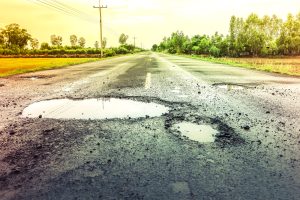Britain’s roads are in dangerous decay. We need to do something, soon.

Stephen Cooke is managing director at Asphalt Group
I’m now swerving on motorways to avoid gouges, cracks, holes and channels, scarred into the surface. Local roads are even worse. Years of doing what we’ve always done – patching, filling and cutting corners – has given the UK some of the worst roads in Europe. Six months after the last shovel of asphalt, the same hole reappears, and we patch again. Why are government and industry locked in this endless loop of mediocrity?
And all politicians seem to do is wring their hands and roll their eyes at the £16bn repair backlog. Time to stop talking and change behaviours. Time to deliver Roads That Last.
And there’s so much at stake: the safety of 40M drivers and hundreds of thousands of cyclists and bikers. Reliable journeys, less congestion, greater productivity and so much precious time that could be saved. Why do these urgent imperatives seem so difficult to grasp?
Valued at £400bn, the local highway network is the largest and most visible national and community asset for which local highway authorities are responsible. It’s used daily by most of us and is the foundation (literally) of the economic, social and environmental wellbeing of the country.
Most journeys start and finish on local roads. So why are millions being wasted on poor repairs, closed roads and record compensation levels for suspension, wheel and tyre damage? We know that there is no ROI on these slap dash repairs. We do them because it’s the easiest and quickest solution at hand. Because we’ve always repaired our local roads this way. It shouldn’t be this way.
Chancellor Rachel Reeves recently announced an extra £500M a year for local roads maintenance from next year and an ‘interim’ settlement for the national network to keep strategic projects moving.
She argued – rightly - that potholes have become a visible symbol of the ‘national decline’ that the Labour party is committed to reversing.
Years of under investment in the road network have led us to where we are. We have to stop talking about potholes and change the narrative one that discusses how we build roads that last.
The industry needs to get better at communicating the importance of extending the life of roads and the range of solutions and technology available. Our roads are strategic assets and we’re not managing or maintaining them properly. Asset management is all about extending the life of the asset, not make do and mend.
Asphalt Group uses proven, lower carbon solutions, that save money, to deliver longer lasting roads.
We need to be honest about why the UK’s roads are in the condition they’re in. It’s a lack of leadership, investment in the solutions of the future, and a lack of awareness of what’s available. The industry needs a reset.
A recent study by the Chartered Institution of Highways and Transportation (CIHT) - Delivering a resilient transport network - provides an overview of the impacts of extreme weather on road infrastructure.
Among several key takeaways, the report states that “there needs to be funding for maintenance to ensure resilience of the transport network, including incrementally adapting infrastructure”.
The roads sector is under increasing pressure to adapt to improving environmental standards and meet the expectations of government and society; including bringing all greenhouse gas emissions to net zero by 2050.
Central and local government must work together to accelerate the transition to sustainable, better roads.
Understanding how to reach net zero and what it encompasses will be key as local councils and their highway departments move towards achieving this goal.
Most local authorities have declared a climate emergency and are taking action to reduce their own carbon emissions and working with partners and communities to tackle the impact of climate change on their local area.
The pressure to act has never been greater and the environmental challenges everyone faces can only be achieved by working together – through central and local government, supply chain partners and stakeholders - to achieve common goals.
Having longer lasting roads helps save money and energy and reduces greenhouse gas emissions, helping to offset pollution generated during road construction and the filling of potholes.
Social, economic, and environmental benefits are brought together through the ambition to build a longer lasting road network.
If we don’t have reliable, safe, technologically advanced roads and continue with this dire culture of constant patching and filling, our country will eventually descend into terminal, inoperable gridlock. We deserve a better future than spades of steaming asphalt.
- Stephen Cooke is managing director at Asphalt Group
Like what you've read? To receive New Civil Engineer's daily and weekly newsletters click here.
 New Civil Engineer Civil engineering and construction news and jobs from New Civil Engineer
New Civil Engineer Civil engineering and construction news and jobs from New Civil Engineer


Have your say
or a new account to join the discussion.